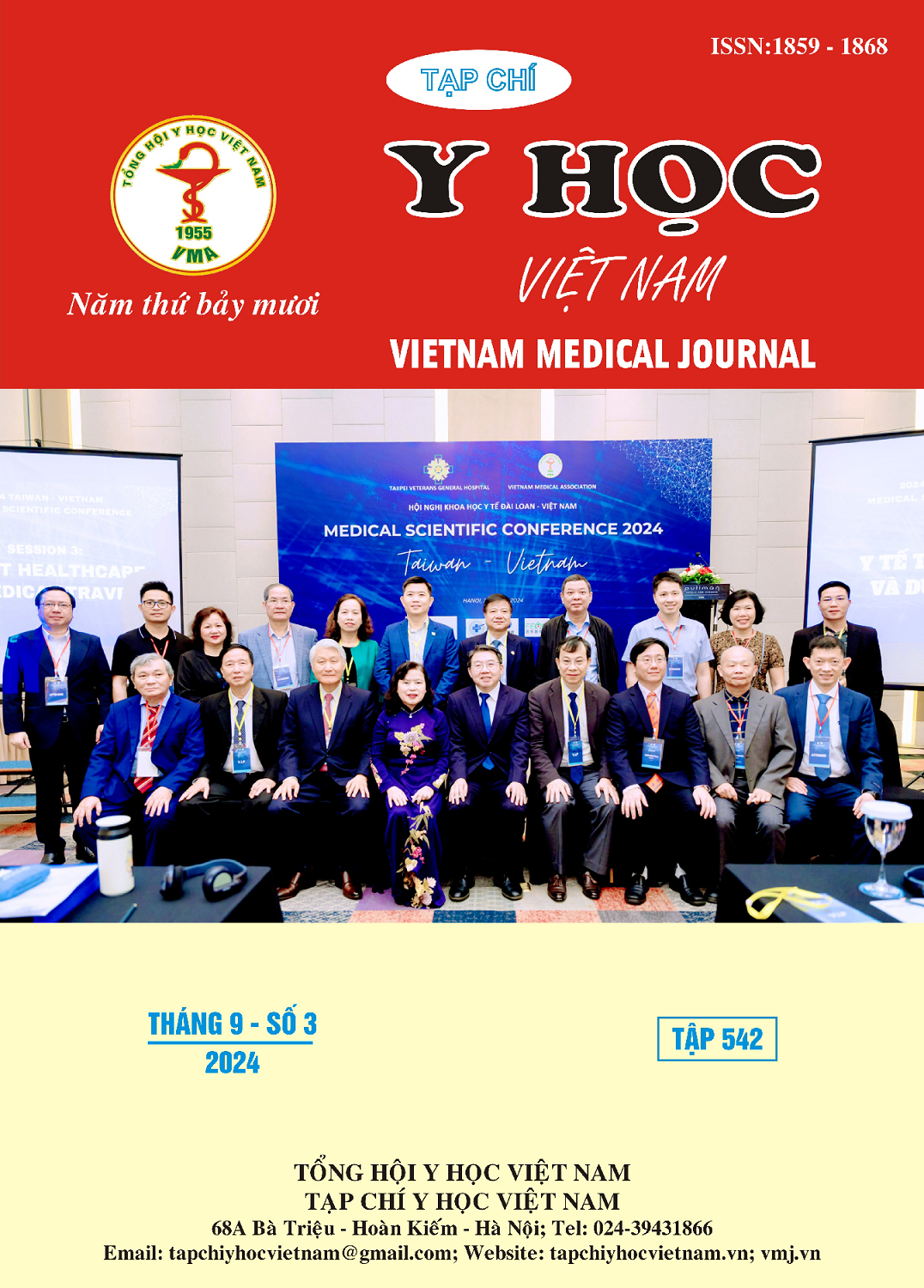THE RESULTS OF TREATMENT OF METASTASIC RECURRENT COLORECTAL CANCER BY FOLFIRI AT NGHE AN ONCOLOGY HOSPITAL
Main Article Content
Abstract
Aims: Evaluate treament results and some toxicities in metastasic recurrent colorectal cancer patients treated with FOLFIRI at Nghe An Oncology Hospital. Patients and methods: descriptive study with longitudinal follow-up on 40 patients with a confirmed diagnosis of metastatic recurrent colorectal cancer, no longer amenable to radical surgery, and treated. using the FOLFIRI regimen at Nghe An Oncology Hospital from September 2017 to September 2023. Results: Complete response rate after 12 cycles reached 35,0%, of which 2,5% of patients achieved complete response and 32,5% of patients achieved partial response, Stable disease accounted for 22,5% of patients. However, 42,5% of patients had progressive disease. Median progression-free survival time of the study patient population was 11,1 months (6,1- 16,0). Factors that prolong progression-free survival of patients with metastatic recurrent colorectal cancer are the number of metastatic sites and response to chemotherapy. Side effects mainly include neutropenia (57,5%), diarrhea (57,5%), vomiting (40,0%), mostly grade 1 and 2.
Article Details
Keywords
Ung thư đại trực tràng tái phát di căn, phác đồ FOLFIRI.
References
2. Cañellas-Socias A, Cortina C, Hernando-Momblona X, et al. Metastatic recurrence in colorectal cancer arises from residual EMP1+ cells. Nature. 2022;611(7936):603-613.
3. Saltz LB, Clarke S, Díaz-Rubio E, et al. Bevacizumab in Combination With Oxaliplatin-Based Chemotherapy As First-Line Therapy in Metastatic Colorectal Cancer: A Randomized Phase III Study. JCO. 2008;26(12):2013-2019.
4. Marquart J, Chen EY, Prasad V. Estimation of the Percentage of US Patients With Cancer Who Benefit From Genome-Driven Oncology. JAMA Oncology. 2018;4(8):1093-1098.
5. Tournigand C, André T, Achille E, et al. FOLFIRI followed by FOLFOX6 or the reverse sequence in advanced colorectal cancer: a randomized GERCOR study. J Clin Oncol. 2004;22(2):229-237.
6. Colucci G, Gebbia V, Paoletti G, et al. Phase III randomized trial of FOLFIRI versus FOLFOX4 in the treatment of advanced colorectal cancer: a multicenter study of the Gruppo Oncologico Dell’Italia Meridionale. J Clin Oncol. 2005;23(22): 4866-4875.
7. Jh K, Sj P, Mi P, et al. FOLFIRI as second-line chemotherapy after failure of FOLFOX4 in advanced colorectal cancer: a Korean single-center experience. The Korean journal of gastroenterology = Taehan Sohwagi Hakhoe chi. 2014;63(1).
8. Trần Xuân V. Đánh giá kết quả điều trị ung thư đại trực tràng tái phát bằng phác đồ Folfiri tại bệnh viện K. 2014. Luận văn bác sỹ chuyên khoa cấp II. Trường Đại học Y Hà Nội
9. Lee MA, Byun JH, Shim BY, et al. Irinotecan, Continuous 5-Fluorouracil, and Low dose of Leucovorin (modified FOLFIRI) as First Line of Therapy in Recurrent or Metastatic Colorectal Cancer. Korean J Intern Med. 2005;20(3):205.
10. Lê Công Đ. Đánh giá kết quả điều trị ung thư đại trực tràng tái phát di căn bằng hóa chất phác đồ FOLFIRI tại Bệnh viện Ung Bướu Hà Nội. 2019. Luận văn thạc sỹ. Trường Đại học Y Hà Nội.


